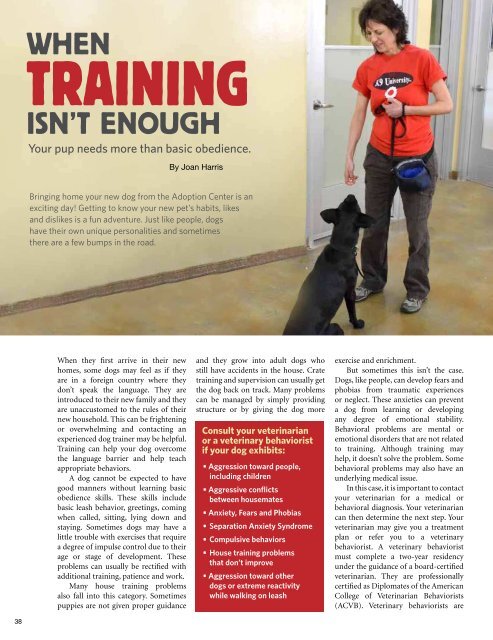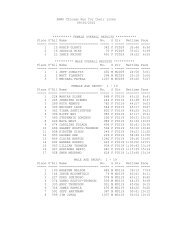DAVID DUFFIELD - PAWS Chicago
DAVID DUFFIELD - PAWS Chicago
DAVID DUFFIELD - PAWS Chicago
Create successful ePaper yourself
Turn your PDF publications into a flip-book with our unique Google optimized e-Paper software.
WHEN<br />
TRAINING<br />
ISN’T ENOUGH<br />
Your pup needs more than basic obedience.<br />
By Joan Harris<br />
Bringing home your new dog from the Adoption Center is an<br />
exciting day! Getting to know your new pet’s habits, likes<br />
and dislikes is a fun adventure. Just like people, dogs<br />
have their own unique personalities and sometimes<br />
there are a few bumps in the road.<br />
knowledgeable in psychopharmacology<br />
and may incorporate medication in<br />
certain cases. They use techniques that<br />
are used in psychiatry and psychology<br />
including behavior modification and<br />
life style changes.<br />
Many times your veterinarian or<br />
veterinarian behaviorist may include an<br />
experienced trainer to help implement<br />
their training plan. In this situation, it is<br />
important that the veterinarian, trainer<br />
and client all work together and keep<br />
the lines of communication open. The<br />
most important thing to remember is<br />
that there are qualified professionals<br />
out there to help. Seek help from these<br />
professionals before the frustration<br />
of dealing with a behavior problem<br />
becomes overwhelming. You and your<br />
dog will both be happy that you did!<br />
Joan Harris is a<br />
regular contributor<br />
to <strong>PAWS</strong> <strong>Chicago</strong><br />
magazine. She serves<br />
as Head Trainer at K9<br />
University and <strong>PAWS</strong><br />
<strong>Chicago</strong>.<br />
Your Pet Matters...<br />
Your Opinion Matters...<br />
Get Paid for Having Both!<br />
Which innovative pet supplies and<br />
services appeal to pet-lovers like you<br />
Major companies want to find out!<br />
So why not share your<br />
thoughts and earn<br />
some extra cash<br />
It’s easier than you think!<br />
Focuscope, Inc. specializes in gathering<br />
consumer opinions and major market<br />
research. Simply visit our website at<br />
www.focuscope.com or call us to learn<br />
how to participate in future market<br />
research projects.<br />
708-386-5086<br />
www.focuscope.com<br />
Absolutely no sales of any kind are involved!<br />
When they first arrive in their new<br />
homes, some dogs may feel as if they<br />
are in a foreign country where they<br />
don’t speak the language. They are<br />
introduced to their new family and they<br />
are unaccustomed to the rules of their<br />
new household. This can be frightening<br />
or overwhelming and contacting an<br />
experienced dog trainer may be helpful.<br />
Training can help your dog overcome<br />
the language barrier and help teach<br />
appropriate behaviors.<br />
A dog cannot be expected to have<br />
good manners without learning basic<br />
obedience skills. These skills include<br />
basic leash behavior, greetings, coming<br />
when called, sitting, lying down and<br />
staying. Sometimes dogs may have a<br />
little trouble with exercises that require<br />
a degree of impulse control due to their<br />
age or stage of development. These<br />
problems can usually be rectified with<br />
additional training, patience and work.<br />
Many house training problems<br />
also fall into this category. Sometimes<br />
puppies are not given proper guidance<br />
and they grow into adult dogs who<br />
still have accidents in the house. Crate<br />
training and supervision can usually get<br />
the dog back on track. Many problems<br />
can be managed by simply providing<br />
structure or by giving the dog more<br />
Consult your veterinarian<br />
or a veterinary behaviorist<br />
if your dog exhibits:<br />
• Aggression toward people,<br />
including children<br />
• Aggressive conflicts<br />
between housemates<br />
• Anxiety, Fears and Phobias<br />
• Separation Anxiety Syndrome<br />
• Compulsive behaviors<br />
• House training problems<br />
that don’t improve<br />
• Aggression toward other<br />
dogs or extreme reactivity<br />
while walking on leash<br />
exercise and enrichment.<br />
But sometimes this isn’t the case.<br />
Dogs, like people, can develop fears and<br />
phobias from traumatic experiences<br />
or neglect. These anxieties can prevent<br />
a dog from learning or developing<br />
any degree of emotional stability.<br />
Behavioral problems are mental or<br />
emotional disorders that are not related<br />
to training. Although training may<br />
help, it doesn’t solve the problem. Some<br />
behavioral problems may also have an<br />
underlying medical issue.<br />
In this case, it is important to contact<br />
your veterinarian for a medical or<br />
behavioral diagnosis. Your veterinarian<br />
can then determine the next step. Your<br />
veterinarian may give you a treatment<br />
plan or refer you to a veterinary<br />
behaviorist. A veterinary behaviorist<br />
must complete a two-year residency<br />
under the guidance of a board-certified<br />
veterinarian. They are professionally<br />
certified as Diplomates of the American<br />
College of Veterinarian Behaviorists<br />
(ACVB). Veterinary behaviorists are<br />
38
















